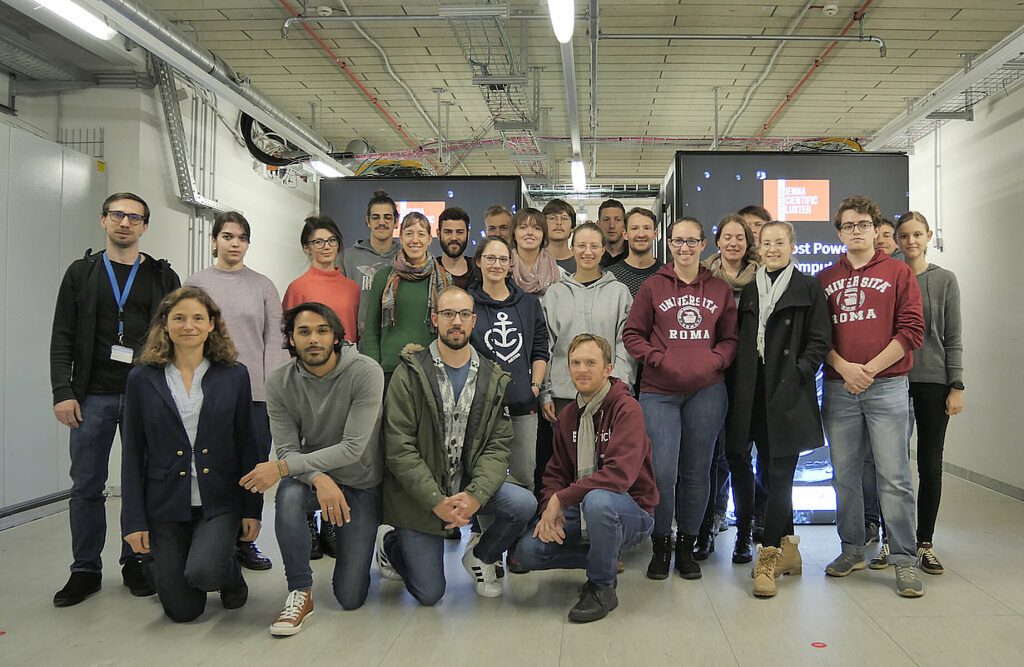
© Michaela Grass
Tackling climate change and understanding our planet requires teamwork and collaboration. We educate and mentor the next generation of climate scientists and promote diversity and inclusion in climate science.
We engage with students of diverse backgrounds on climate issues. In 2021, we contributed to the UNIVIE MOOC “KliMO: Klimawandel – Wissenschaftliche Grundlagen”, and we continue to contribute to the related Erweiterungscurriculum at the UNIVIE Faculty of Earth Sciences, Geography and Astronomy. We also teach meteorology and climate science for the MSc Computational Science of UNIVIE.
A complete list of our past and ongoing teaching activities can be retrieved for individual team members from https://ufind.univie.ac.at (e.g., for Aiko Voigt).
Research-oriented teaching
Our teaching approach emphasizes interactive, hands-on learning, particularly through programming exercises and the use of climate models. For instance, students in the Modeling and Data Analysis class perform their own ICON climate model simulations on the VSC supercomputer, which we also visit during one of the lectures. The Climate Modeling Lab class goes even further by enabling students to conduct small research projects, where they first modify the ICON source code before performing their own simulations. This hands-on experience immerses them in a typical research workflow in atmospheric sciences.
Student projects
We continously offer topics for BSc and MSc theses related to our research. If you are interested in working with us please get in contact with Aiko Voigt. To learn more about how we advise students, please take a look at our guidelines for BSc students and MSc students. Interested students should also study our team values and culture and have a look at our guidelines for writing and plotting.
MSc Theses
- Miriam Kornblueh (ongoing): ML evaluation of high-resolution climate models
- Shirin Hamzeh Marand (ongoing): tracers and ice clouds
- Marijan Trogrlic (ongoing): a world without high clouds
- Johannes Hobiger (ongoing): IceCloudNet dataset
- Georg Brack (ongoing): climate of tidally locked Earth-like exoplanets
- Patricia Schluschanek (ongoing): Klimawandel und Photovoltaik-Ertrag
- Isabella Winterer (ongoing): Earth as an exoplanet
- David Merei (ongoing): Cloud-radiative heating and extratropical cyclones
- Natalie Auer (2025): Convectively coupled equatorial waves and their impact on precipitation, https://ubdata.univie.ac.at/AC17638341.
- Julian Merio (2024): Exploring Classifier Skill in Distinguishing Climate Model and Observational Data, https://utheses.univie.ac.at/detail/73087.
- Anatol Waba (2024): Snowball Earth and waterbelt states in ExoCAM, https://utheses.univie.ac.at/detail/71767.
- Maximilian Meindl (2024): Changes in heatwave properties under climate change, https://utheses.univie.ac.at/detail/70854.
- Kerstin Haslehner (2023): Cloud radiative effects of high-level clouds and their impact on climate, https://utheses.univie.ac.at/detail/67015.
- Klara Butz (2022): The radiative impact of clouds on extratropical cyclones, https://utheses.univie.ac.at/detail/63718.
- Manuel Huber (2022): Atmospheric and surface pathways of the cloud-radiative impact on the circulation response to warming, https://utheses.univie.ac.at/detail/63548.
BSc Theses
- Alexander Wadsak (ongoing): transmission spectroscopy for tidally-locked Earth-like exoplanets
- Elias Ertschnig (2025): How strong is the seasonal cycle in Earth’s transmission spectrum?
- Matej Paul (2025): Early warning signals fail to predict tipping points in Snowball Earth simulations
- Jakob Domenig (2024): Extracting forced warming signals from daily temperature patterns across different scales
- Stephan Hajek (2024): Analyse eines Fehlers in der Definition der Hitzemetrik Cumulative Heat
- Paul Splechtna (2024): Identification and characterisation of cloud objects using connected component labelling in nextGEMS cycle 3 ICON simulations
- Paulina Grüneis (2023): Atmosphärische Wolkenstrahlungseffekte von Eiswolken und deren Auswirkungen auf das Klima
- David Schuhbauer (2022): Niederschlagsvariabilität in der Sahelzone auf der täglichen Skala in expliziten Konvetionsmodellen und TRACMIP Simulationen
- Natalie Auer (2022): Wolkenstrahlungseffekte in einer Schneeball-Erde-Simulation
- Romana Springer (2022): Wie beeinflusst eine globale Erwärmung den Eisgehalt in der Atmosphäre? Eine Analyse mithilfe von Klimamodellen des CMIP6
 Climate Dynamics and Modeling
Climate Dynamics and Modeling